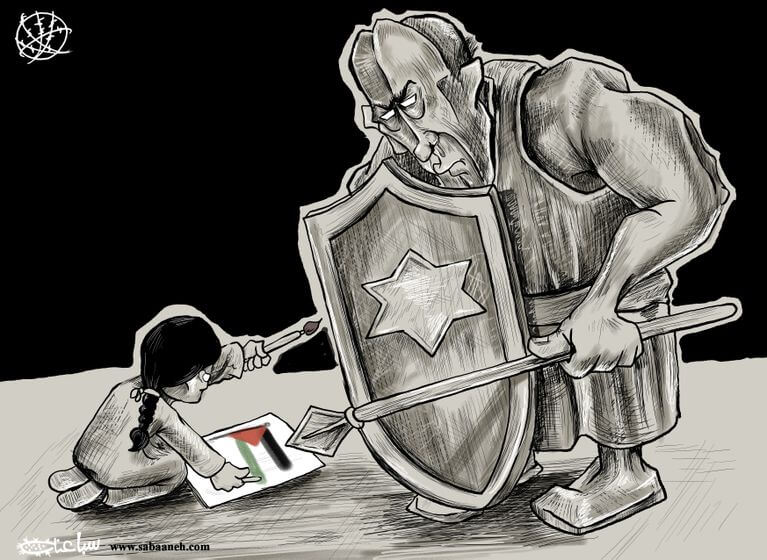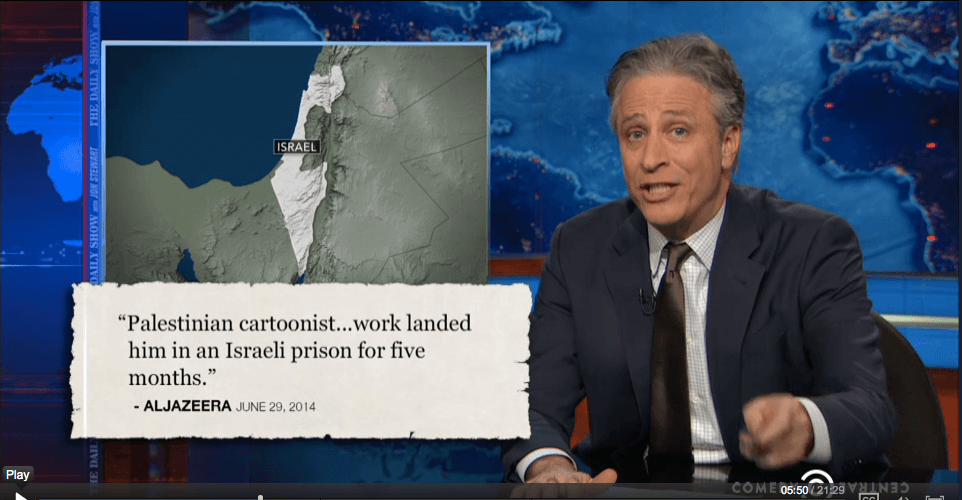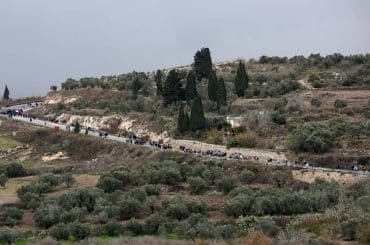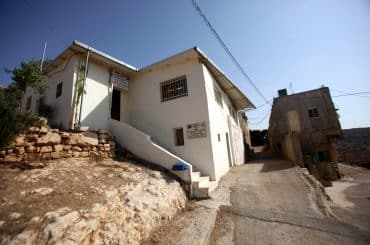When Mohammad Saba’aneh was growing up in Kuwait, his parents used to show him newspapers featuring the work of Naji al-Ali, the famous Palestinian cartoonist who published in Kuwaiti papers. Al-Ali’s cartoons were used to tell the young Saba’aneh about Palestine.
Today, the 36-year-old follows in the footsteps of al-Ali by creating political cartoons about the Arab world, and particularly the plight of the Palestinians.

Saba’aneh, who now lives in Ramallah after residing in Jordan following the 1991 Gulf War, is among the most well-known Palestinian artists today. His cartoons are simple but striking. His art frequently includes images of Palestinian prisoners, Israeli soldiers and Palestinian refugees. He has also taken on the Islamic State and Arab regimes. Israeli authorities arrested Saba’aneh in February 2013, and he was held for five months.
“My main aim now, just with the cartoons, [is] to let the people abroad know more and more about the Palestinian issue,” Saba’aneh told me last week. “Most of the people do not really know about what’s happening in Palestine.”
I spoke with the cartoonist, a wiry and youthful looking man who speaks calmly and wears big, round glasses, at Manhattan’s New School before a talk he gave titled, “Beyond Handala: Editorial Cartooning and Comics in Palestine.” The event, part of the New School’s weekly symposium on comics, featured Saba’aneh talking about the history of Palestinian cartoonists, his own work and freedom of expression in Israel/Palestine. He was in the U.S. at the invitation of the Palestine Liberation Organization, who hosted him for an April 17 Land Day event at their offices in Washington, D.C.
Saba’aneh is a cartoonist for Al-Hayat Al-Jadida (The New Life), an organ of the Palestinian Authority (PA). He doesn’t make enough money to live on his art, so he works as a manager for the Ramallah branch of the Arab American University, located in Jenin. He said that he sometimes draws cartoons in his university office, and then returns home to finish them by hand or on a computer. Asked why many of his cartoons have no text, he said that he “want[s] to talk to the international people.”
Saba’aneh has a vexed relationship with the Palestinian Authority. His work is published by a PA-controlled newspaper. “I can draw whatever I want to draw, but they may not publish all of my cartoons,” he tells me when I ask him whether he has full editorial control over his work. “Some of my cartoons may make a problem for the Palestinian Authority with another arab country.” The PA is allied with conservative, pro-Western states in the Gulf, like Saudi Arabia.
In February, Saba’aneh published a cartoon he said was meant to represent the message of the Prophet Muhammed–but not the Prophet himself. Conservative adherents of Islam are against depictions of the Prophet, though historically, some Islamic art has shown the Prophet Muhammed. In response to the cartoon, PA President Mahmoud Abbas admonished the paper and ordered an inquiry into the decision to publish the cartoon, a move that came weeks after Abbas marched in Paris to protest the attacks on Charlie Hebdo, a magazine that derided the Prophet. Newspaper staffers responsible for publishing it were reportedly suspended. Saba’aneh told the New School crowd he was asked to apologize for the cartoon. He said he would only apologize to God–and not to people demanding an apology.
The Israeli authorities have also given him trouble. In 2013, Saba’aneh traveled to Jordan for a conference. When he tried to travel back to Palestine, Saba’aneh was stopped and arrested by Israeli authorities at the Jordan-Israeli border crossing. Held for five months, he was eventually charged and convicted in a military court of aiding an illegal organization–in this case, Hamas. Israeli officials said Saba’aneh had handled funds for his brother, a member of Hamas. Saba’aneh has said he gave the funds to another person in Jordan because “he suspected the funds were linked to Hamas,” according to a Radio Netherlands report. International advocates for Saba’aneh charged Israel with targeting him for his political art.
Saba’aneh was reticent to talk about the arrest.
“I will answer this question carefully, because maybe something could make problems with Israel, when I go back to Palestine,” he said, adding that he was arrested for his cartoons. “The Americans have to know that if Mohammad Saba’aneh is a terrorist, like Israel wants to say, then the United States will not give him a visa to visit the United States.” Saba’aneh say he has obtained a U.S. visa five times. Israeli border officials did not hassle him on his way out, he said.
His arrest attracted the most attention after the Charlie Hebdo attacks lead world leaders like Israeli Prime Minister Benjamin Netanyahu to march in Paris for free speech. Netanyahu was called out by Daily Show host Jon Stewart for marching for free speech while presiding over an army that detained Saba’aneh.

The cartoonist called the Daily Show segment “a victory for Palestinians, that our voice reach the people in the United States.”
Saba’aneh is intent on changing American minds about Israel/Palestine.
“The art is a good language to talk to the people, in the United States and around the world,” he said. “The government here is considered a big supporter of Israel, and we have to talk to the people here. It’s a democratic country, the people can change the government direction.”



A really great article about the brilliant Palestinian cartoonist, Mohammad Saba’aneh.
Thanks so much, Alex.
Thank you for this. Truth matters.